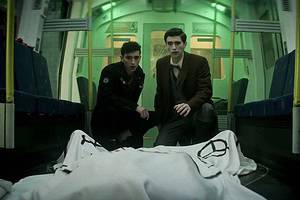When Netflix released Martin Scorsese’s The Irishman in 2019, a graphic circulated on social media advising viewers how to break up the 209-minute-long film into a miniseries. Whatever its intent, the graphic was an implicit statement that, in the streaming era, films with perceived-to-be overblown runtimes were hard for audiences to digest. (The validity of that argument has been challenged several times since then, most notably with Oppenheimer and Scorsese’s own Killers of the Flower Moon.)
While that graphic may violate authorial intent and imply that today’s audiences have tragically lacking attention spans, it also raised an opportunity. What if you could make a long film into a limited series? More than a director’s cut, a limited series could, theoretically, leverage a new medium to explore and re-contextualize short-changed or removed storylines, making something genuinely compelling (and easily digestible for those aforementioned audiences).

You can imagine the appeal of a second shot for Baz Luhrmann. The Oscar-nominated filmmaker followed up the wildly successful Moulin Rouge with Australia, a passion project about his home country set during the early days of World War II. The film, starring Nicole Kidman and Hugh Jackman, experienced fraught production, negative headlines, middling reviews, and a disappointing box office gross. Given his connection to the material and the fresh industry capital he amassed after the success of Elvis, it makes sense that Luhrmann would take advantage of Hollywood’s thirst for remotely identifiable and reconfigurable IP to finally make Australia work.
Faraway Downs is the end result: a six-episode series that expands the story of the titular ranch in Australia’s Northern Territories. As in the film, Lady Sarah Ashley (Kidman) travels to Australia to retrieve her husband, who’s spent months setting up a cattle ranching business. When she arrives, she’s greeted by The Drover (Jackman), a rough-and-tumble freewheeling stockman who shepherds cattle across territories. Sarah discovers that her husband was murdered, reportedly by an Aboriginal tribal elder named King George (David Gullpilil). In need of money, Sarah takes charge of Faraway Downs, enlisting the help of the Drover and King George’s grandson Nullah (Brandon Walters). Sarah finds herself battling for control of the ranching industry, so lucrative that people will kill for it. Meanwhile, the looming threat of war threatens to destroy everything Sarah holds dear, like the found family she starts building with the Drover and Nullah.

Australia had many ideas to fit into roughly 2 and a half hours, and you feel the gaps in the film. Faraway Downs fills in many, greatly improving the narrative and fleshing out its characters. The most consequential gap filled is the crew’s journey through the Never Never desert. The series’ third episode expands on their ordeal, the centerpiece of which is a stunning scene where Sarah, the Drover, and Nullah nearly perish in a dust storm. More than just a powerful set piece, it also adds necessary development to the three characters and how their connection blossoms amidst the life-threatening danger. In that moment, the Drover sees his boss as a potential life partner, and Sarah starts regarding Nullah as her child. The scene is so critical to the characters’ arcs that it’s absurd that it was ever removed.
The most significant change in Faraway Downs is the ending, which is a more tragic deviation from the original film. Of the two endings, the series’ approach to closing out Lady Ashley’s story rings more true, with a painful but beautiful resolution to her and the Drover’s sweeping romance. (It also resolves the mystery of the Drover’s real name, which I doubt many Australia viewers had even considered.) The scene itself is a bit self-indulgent, lingering a few beats longer than necessary. However, it is a powerful coda that is beautifully acted by Kidman and Jackman.

While the series does color in several missing details, Faraway Downs stumbles into its own problems. Luhrmann, a filmmaker of great excess, can sometimes skew into self-indulgence with his series. He adds extraneous sweeping location shots and extends some scenes beyond their relevance (such as King Carney’s murder), further diluting the narrative’s potency. Even the most generous reading of those choices leads back to padding the episodes’ runtime, rather than expanding our appreciation of the story. The time might’ve been better spent diving deeper into the psychological and cultural damage done to the Stolen Generations, particularly through the prism of Neil Fletcher’s relationship with Nullah. Unfortunately, that would be impossible without a time machine, as nearly two decades have passed since the original production. With reshoots and rewrites largely off the table, it leaves the series restricted in reinventing, or even re-contextualizing its story.
Faraway Downs doesn’t quite justify itself as a limited series; the episodic structure largely feels like a long movie broken up into parts. However, it succeeds as a revision and refinement of Australia. The series as a whole is a fuller narrative experience, with more substantial characters and richer worldbuilding. A more traditional director’s cut likely would’ve resolved the same issues. Still, in this streaming landscape, there’s something compelling in experimenting with form and medium to revitalize an old work or achieve its intended vision.
The question is, if the end (literally) justified the means in this case, what does this mean for the future of Hollywood? Not every filmmaker is as bold as Baz Luhrmann, but that might not be a barrier to entry. It’s an innovation that audiences will have to keep a close eye on in the near future.
Faraway Downs is currently available to stream on Hulu.
Faraway Downs doesn’t quite justify itself as a limited series; the episodic structure largely feels like a long movie broken up into parts. However, it succeeds as a revision and refinement of Australia.
-
GVN Rating 7
-
User Ratings (1 Votes)
8.4
A late-stage millennial lover of most things related to pop culture. Becomes irrationally irritated by Oscar predictions that don’t come true.







